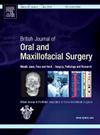追求口腔颌面外科的二学位学生的健康和福祉。
IF 1.7
4区 医学
Q3 DENTISTRY, ORAL SURGERY & MEDICINE
British Journal of Oral & Maxillofacial Surgery
Pub Date : 2025-04-01
DOI:10.1016/j.bjoms.2024.08.009
引用次数: 0
摘要
攻读口腔颌面外科(OMFS)专业的二学位学生在努力寻找全日制学位、实习工作和为专业培训申请开发作品集之间的平衡时,可能特别有倦怠的风险。本研究旨在探讨考虑在OMFS工作的二学位学生的自我报告倦怠和确定倦怠的风险因素。一项在线调查通过社交媒体向英国各地的二学位学生分发,收到了122份回复。大多数学生认为他们在第二学位期间遭受了倦怠(n = 74, 60.7%)。四年制牙科学位的学生(p = 0.016, OR 6.291, 95% CI: 1.402至28.235)、女学生(p = 0.006, OR 5.791, 95% CI: 1.659至20.219)、28-30岁(p = 0.032, OR 5.818, 95% CI: 1.165至29.054)或34至36岁(p = 0.008, OR 14.882, 95% CI: 1.998至110.826)更容易报告倦怠。与每月夜班超过6次的学生相比,每月夜班为零的学生患倦怠的可能性显著降低(p = 0.016, OR: 0.034, 95% CI: 0.002至0.537)或每月白班超过6次的学生(p = 0.028, OR: 15.272, 95% CI: 1.335至174.732)。通过将经济和临床发展激励措施作为定期实习工作机会的一部分,通过提供量身定制的OMFS指导,以及通过简化培训,有可能降低二学位学生的倦怠风险,提高他们的幸福感。本文章由计算机程序翻译,如有差异,请以英文原文为准。
Health and wellbeing of second-degree students pursuing oral and maxillofacial surgery
Second-degree students pursuing oral and maxillofacial surgery (OMFS) may be at particular risk of burnout when striving to find a balance between a full-time degree, locum work, and developing portfolios for specialist training applications. The current study aimed to explore self-reported burnout and identify risk factors for burnout amongst second-degree students considering a career in OMFS. An online survey was distributed via social media to second-degree students across the United Kingdom and 122 responses were received. A majority of students felt they had suffered from burnout during their second degree (n = 74, 60.7%). Burnout was more likely to be reported by students enrolled on a four-year dental degree (p = 0.016, OR 6.291, 95% CI: 1.402 to 28.235), by female students (p = 0.006, OR 5.791, 95% CI: 1.659 to 20.219), and those aged 28-30 (p = 0.032, OR 5.818, 95% CI: 1.165 to 29.054) or between 34 and 36 years (p = 0.008, OR 14.882, 95% CI 1.998 to 110.826). Students doing zero night shifts per month were significantly less likely to suffer from burnout compared with those doing more than six night shifts per month (p = 0.016, OR: 0.034, 95% CI: 0.002 to 0.537) or more than six day shifts per month (p = 0.028, OR: 15.272, 95% CI: 1.335 to 174.732). It may be possible to reduce the risk of burnout amongst second-degree students and enhance their wellbeing by improving financial and clinical development incentives as part of regular locum work opportunities, by providing access to tailored OMFS mentorship, and by streamlining training.
求助全文
通过发布文献求助,成功后即可免费获取论文全文。
去求助
来源期刊
CiteScore
3.60
自引率
16.70%
发文量
256
审稿时长
6 months
期刊介绍:
Journal of the British Association of Oral and Maxillofacial Surgeons:
• Leading articles on all aspects of surgery in the oro-facial and head and neck region
• One of the largest circulations of any international journal in this field
• Dedicated to enhancing surgical expertise.

 求助内容:
求助内容: 应助结果提醒方式:
应助结果提醒方式:


